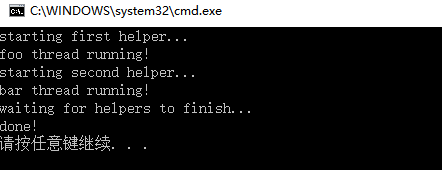1 join()
waits for a thread to finish its execution; waiting thread is finished.
It is to join the main thread waits for all current sub-thread execution finished, to exit
// threadTest.cpp : 定义控制台应用程序的入口点。
//
#include "stdafx.h"
#include <iostream>
#include <thread>
#include <string>
#include <chrono>
#include <mutex>
#include <windows.h>
using namespace std;
void foo()
{
// simulate expensive operation
std::cout << "foo thread running!\n";
std::this_thread::sleep_for(std::chrono::seconds(1));
}
void bar()
{
// simulate expensive operation
std::cout << "bar thread running!\n";
std::this_thread::sleep_for(std::chrono::seconds(1));
}
int main()
{
std::cout << "starting first helper...\n";
std::thread helper1(foo);
std::cout << "starting second helper...\n";
std::thread helper2(bar);
std::cout << "waiting for helpers to finish..." << std::endl;
helper1.join();
helper2.join();
std::cout << "done!\n";
return 0;
}
operation result:

2.detach
permits the thread to execute independently from the thread handle
Allow independent execution threads in the thread handle
// threadTest.cpp : 定义控制台应用程序的入口点。
//
#include "stdafx.h"
#include <iostream>
#include <thread>
#include <string>
#include <chrono>
#include <mutex>
using namespace std;
void independentThread()
{
std::cout << "Starting concurrent thread.\n";
std::this_thread::sleep_for(std::chrono::seconds(2));
std::cout << "Exiting concurrent thread.\n";
}
void threadCaller()
{
std::cout << "Starting thread caller.\n";
std::thread t(independentThread);
t.detach();
std::this_thread::sleep_for(std::chrono::seconds(1));
std::cout << "Exiting thread caller.\n";
}
int main()
{
threadCaller();
std::this_thread::sleep_for(std::chrono::seconds(5));
return 0;
}
operation result:

